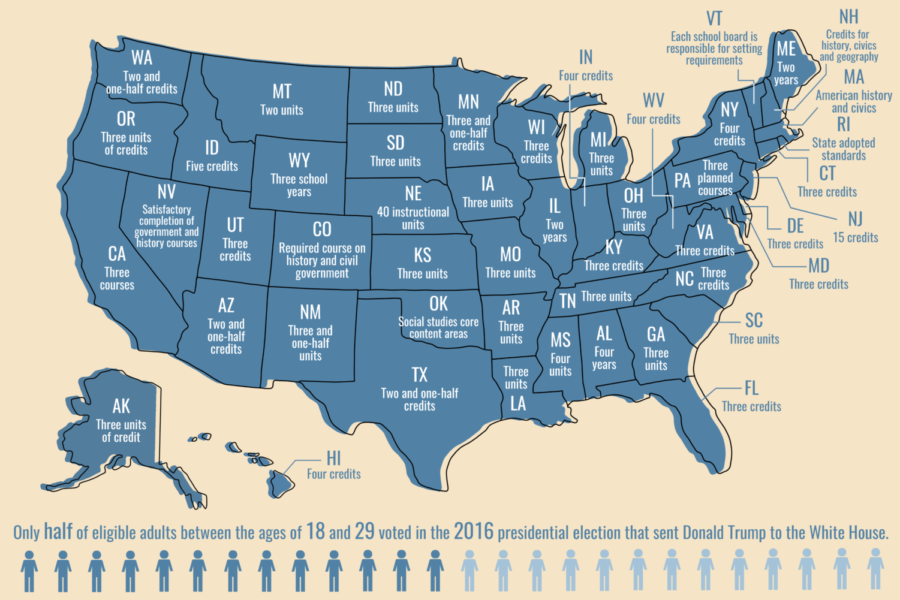Bring back robust civics education to strengthen democracy
States have varied requirements for civics education, but general civic knowledge and youth voter participation remain low. The Sidekick staff writer Akansha Singh believes there is a lack of sufficient civics education and learning about these topics can help American citizens take initiative in participating in political issues. Graphic by Kaylee Aguilar.
October 28, 2019
In a deeply fractured America, sound knowledge of facts and how our democracy functions are crucial. However, polarization and divides continue to deepen, in part due to the waning presence of civics education.
Young voters have historically had some of the lowest rates of voter turnout in the United States. The percentage of voters aged 18-24 who voted in the 2018 midterms remained at a meager 31%, compared to 60% for people aged 65 years or older. In Presidential Elections, youth voter turnout rises to about 50%, but that still accounts for half of the population that does not vote.
Civics education requirements have been loosened since the 1960s, correlated with a decline in youth voter turnout. Only eight U.S. states require a full year’s length of civics education in high school; Texas requires a semester.
The consequences of this are staggering. Only 26% of respondents to a 2017 survey conducted by the Annenberg Public Policy Center could accurately name the three branches of government. Thirty-seven percent of respondents could not name any rights guaranteed by the First Amendment. How can we expect voters to make well-informed decisions about their government without a firm foundation of this rudimentary knowledge?
If we truly want to mend a fractured America and truly have a government for the people and by the people, we need stronger civics education.
Civics education is not only a study of how government functions; it allows students to understand their rights and responsibilities as citizens and residents of America. It is crucial to understand the very principles and inner workings of our government because the votes we cast (or the votes we never cast) directly impact our lives and the lives of everyone around us.
“I want all of our kids to understand their right to vote, why they vote, the issues going on and how our whole nation was formed,” Coppell High School Principal Laura Springer said. “We have a voice, and that voice is very important. We love to gripe and complain about people who get into office, but we don’t do our part in making sure we vote for people who propose what we want in society.”
Civics help demonstrate to students the complexities in political decisions and actions, and that no issue is truly black and white. Without knowledge of civics, votes are made blindly. In addition, civics can bring unity and cohesion to combat stark partisanship, because it promotes respect and a deeper understanding of others’ opinions and beliefs.
Organizations, such as iCivics, created by former Supreme Court Justice Sandra Day O’Connor, and the Interactive Constitution, a nonpartisan initiative to show both left and right-wing sides of thinking, take a step in the right direction by bolstering students’ knowledge of civics. These organizations aim to teach students about the principles of government and civic responsibilities not solely through memorization, but by showing students how these concepts play out in real life through interactive games, podcasts and other elements.
Online initiatives such as the ones mentioned above are accessible resources, but it is also worth considering bolstering the civics curriculum in schools. Florida requires civics education to begin in elementary schools; since, the state has seen increasing levels of civic proficiency in students. Having voter registration booths at high schools, like CHS recently had, and discussing civic responsibilities in government classes, are steps in the right direction.
We have a voice, an incredibly potent tool – now we must know how to use it.
Follow Akansha (@akanshas120) and @CHSCampusNews on Twitter.












Blanche Harris • Oct 30, 2019 at 9:28 am
Great story Akansha!!